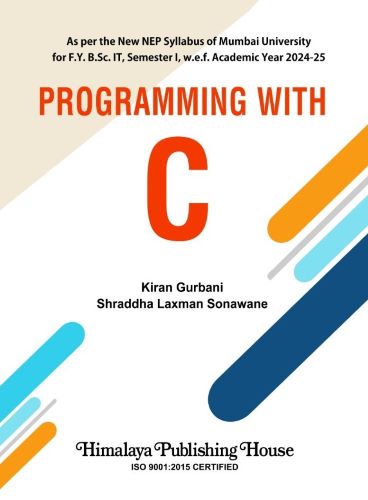Welcome to the world of C programming! This book is specifically designed for F.Y. B.Sc. IT students who are embarking on their journey into the world of programming. It assumes no prior knowledge of programming and starts from the basics, gradually building up to more advanced topics. Each concept is explained in detail, with plenty of examples to illustrate how they can be applied in real-world scenarios.
Whether you are new to programming or looking to strengthen your foundation in C, this reference book aims to provide you with a clear, concise, and practical approach to learning.
Contents –
Module 1
Chapter 1: Introduction to C Language
1.1 Algorithms
1.2 History of C Programming
1.3 Structure of C Program
1.4 Program Characteristics
1.5 Compiler, Linker and Pre-processor
1.5.1 Pre-processor
1.5.2 Compiler
1.5.3 Linker
1.6 Pseudo Code Statements and Flowchart Symbols
1.6.1 Pseudo Code
1.6.2 Flowchart Symbols
1.7 Desirable Program Characteristics
1.8 Compilation and Execution of a Program
1.9 C Character Set
1.10 Identifiers and Keywords
1.10.1 Identifiers
1.10.2 Keywords
1.11 Data Types
1.12 Constants
1.13 Variables
1.14 Character
1.14.1 Character Strings
1.15 typedef
1.16 Typecasting
Chapter 2: Types of Operators
2.1 Arithmetic Operators
2.2 Relational Operators
2.3 Logical Operators
2.4 Increment and Decrement Operators
2.5 Assignment Operators
2.6 Conditional Operator
2.7 Assignment Operator and Expression
2.8 Precedence and Order of Evaluation Block Structure
2.9 C Preprocessor
Module 2
Chapter 3: Control Flow
3.1 Introduction
3.2 Statements and Blocks
3.3 Conditional Statements
3.3.1 If Statement
3.3.2 If-Else Statement
3.3.3 Else-if Statement
3.4 Switch-case Statement
3.5 Loop
3.5.1 While Loop
3.5.2 Do-while Loop
3.5.3 For Loop
3.6 Break Statement
3.7 Continue Statement
3.8 Goto and Labels
Chapter 4: Functions
4.1 Introduction
4.4.1 Purpose of Function
4.2 Types of Function
4.2.1 User Defined Function
4.2.1.1 Function Definition
4.2.1.2 Function Declaration
4.2.1.3 Function Call
4.2.2 Library Functions
4.3 Console based I/O and Related Built-in I/O Functions
4.3.1 printf(), scanf()
4.3.2 getch(), getchar()
4.4 Formatted Input and Formatted Output
4.4.1 Formatted Input
4.4.2 Formatted Output
Chapter 5: Pointer and Addresses
5.1 Definition
5.2 Declaration
5.3 Initialization
5.3.1 Null Pointer
5.3.2 What Happens at Memory Level
5.4 Indirection Operator and Address of Operator
5.5 Pointer Arithmetic
5.6 Functions and Pointers
5.6.1 Pointers as Function Arguments
5.6.2 Functions Returning Pointers
5.7 Pointers and Arrays
Chapter 6: User Defined Data Types
6.1 Introduction to Structure
6.1.1 Definition
6.1.2 Declaration
6.1.3 Accessing Members
6.1.4 Structure Operations
6.2 Introduction to Union
6.2.1 Definition of a Union
6.2.2 Declaration of a Union
6.2.3 Accessing a Union
6.3 Key Differences
Practical’s of Programming with C






